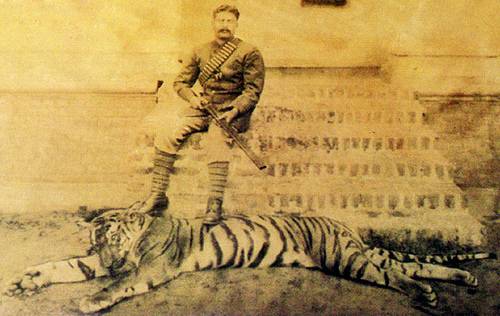
In March 1942, HMS Trinidad launched a torpedo at a German destroyer.
The torpedo had a faulty gyro: It swam in a circle and returned to the ship.
Thirty-two men were killed.

In March 1942, HMS Trinidad launched a torpedo at a German destroyer.
The torpedo had a faulty gyro: It swam in a circle and returned to the ship.
Thirty-two men were killed.
G.K. Chesterton used the term moor eeffocish to describe the queerness sometimes glimpsed in familiar things. He borrowed the phrase from Charles Dickens, who as an unhappy child would sometimes sit in a coffee shop in St. Martin’s Lane:
In the door there was an oval glass plate with ‘COFFEE ROOM’ painted on it, addressed towards the street. If I ever find myself in a very different kind of coffee-room now, but where there is such an inscription on glass, and read it backwards on the wrong side, MOOR EEFFOC (as I often used to do then in a dismal reverie), a shock goes through my blood.
J.R.R. Tolkien later wrote: “The word Mooreeffoc may cause you to realise that England is an utterly alien land, lost either in some remote past age glimpsed by history, or in some strange dim future reached only by a time-machine; to see the amazing oddity and interest of its inhabitants and their customs and feeding-habits.”
94 + 44 + 74 + 44 = 9474

Below the king’s chamber in the Great Pyramid of Giza there’s a smaller room whose purpose is unknown. A narrow shaft ascends to the south from that chamber. It’s only 8 inches wide, too narrow for a human to climb, but in 1992 a German robot crawled 65 meters up the incline and discovered a stone door with copper handles. In 2003 a second robot drilled a hole through that door and discovered a second door behind it.
“It looks to me like it is sealing something,” said Zahi Hawass, head of the Egyptian Supreme Council of Antiquities. “It seems that something important is hidden there.”
What is it? Who knows?
Benjamin Disraeli often received unsolicited manuscripts from authors seeking his opinion. He had a standard reply:
“Thank you for the manuscript; I shall lose no time in reading it.”
See also Backhanded Letters of Reference.
Married: Moses Alexander, aged 93, to Mrs. Frances Tompkins, aged 105. They were married in Bath, Steuben county, N. Y., June 11, 1831. They were both taken out of bed dead the following morning.
— The Register of the Kentucky State Historical Society, 1938
In 1912, inventor Lee De Forest was arrested and charged with mail fraud for promoting an early vacuum tube using “absurd and deliberately misleading statements.”
“De Forest has said in many newspapers and over his own signature that it would be possible to transmit the human voice across the Atlantic before many years,” the district attorney charged. “Based on these absurd and deliberate misleading statements, the misguided public … has been persuaded to purchase stock in his company.”
Two years later, De Forest transmitted his voice from Arlington, Va., to the Eiffel Tower.

Sam Loyd claimed to have sold “one thousand million” of these puzzles in the late 1800s, but the solution requires an insight that most solvers overlooked.
“Cut out the six pieces very carefully, then try to arrange them to make the best possible figure of a horse. That is all there is to it, but the entire world laughed for a year over the many grotesque representations of a horse that can be made with those six pieces.”
Singular circumstance — A lady resident in Devonshire, going into one of her parlours, discovered a young ass, who had found its way into the room, and carefully closed the door upon himself. He had evidently not been long in this situation before he had nibbled a part of Cicero’s Orations, and eaten nearly all the index of a folio edition of Seneca in Latin, a large part of a volume of La Bruyere’s maxims in French, and several pages of Cecilia. He had done no other mischief whatever, and not a vestige remained of the leaves that he had devoured. Will it be fair henceforward to dignify a dunce with the name of this literary animal?
— Pierce Egan, Sporting Anecdotes, Original and Selected, 1822

Death plays tricks in India. Prince Ramendra Narayan Roy died in Darjeeling in 1909 and turned up alive 12 years later in Dhaka. He didn’t remember the details, he said; he’d been found lying in the jungle and had wandered India as a religious ascetic until his memory had returned.
The Board of Revenue offered proof that Roy had been cremated, but the prince’s tenants believed the claimant and supported his bid for the old estate. Hundreds of witnesses testified variously through 10 years of legal wrangling, which ultimately decided in favor of the mysterious stranger.
His vindication was short-lived, though. Hours after the final hearing, the claimant had a fatal stroke — and, this time, he stayed dead.
See also The Tichborne Claimant.